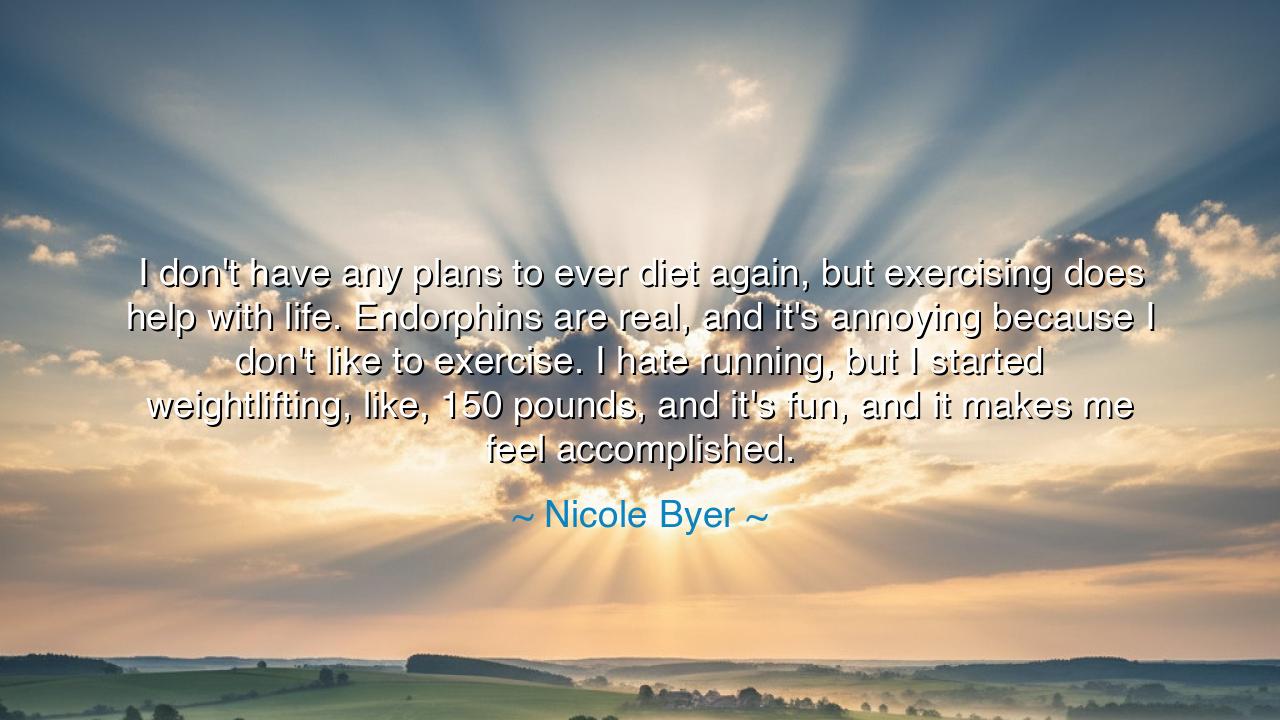
I don't have any plans to ever diet again, but exercising does
I don't have any plans to ever diet again, but exercising does help with life. Endorphins are real, and it's annoying because I don't like to exercise. I hate running, but I started weightlifting, like, 150 pounds, and it's fun, and it makes me feel accomplished.





In the spirited words of Nicole Byer, there echoes the eternal struggle of the human soul between comfort and transformation: “I don’t have any plans to ever diet again, but exercising does help with life. Endorphins are real, and it’s annoying because I don’t like to exercise. I hate running, but I started weightlifting, like, 150 pounds, and it’s fun, and it makes me feel accomplished.” Beneath her humor lies a truth that has traveled through the ages — that strength is not born of pleasure, but of perseverance; not of denial, but of balance. Hers is the voice of one who has come to peace with her body by waging war with her own expectations.
The ancients would have understood this wisdom well. In the temples of Greece, men and women sculpted both mind and flesh, believing that discipline was the highest form of beauty. But unlike the cold austerity of punishment, Byer’s words teach a new kind of mastery — one built on acceptance. She rejects the endless cycle of dieting, that illusion of control that often brings only guilt and emptiness. Instead, she embraces the body not as an enemy to be conquered, but as a companion to be honored. Her defiance is sacred rebellion: to choose joy over restriction, and movement over self-condemnation.
When she speaks of exercise, she names not a vanity, but a medicine for the soul. The endorphins — those small sparks of inner light that arise from motion — are the reward nature has woven into the body’s design. To move is to awaken the sleeping joy within; to sweat is to burn away the heaviness of the spirit. Yet she admits with disarming honesty: “I hate running.” How human this confession is! For even the wise often resent the very thing that brings them growth. Like the blacksmith who curses the heat of his forge, she despises the fire even as it refines her.
There is a great truth hidden here: transformation rarely feels good at first. In every age, progress has demanded friction. Recall Milo of Croton, the ancient athlete who, legend tells, lifted a calf upon his shoulders each day. As the calf grew into a bull, so did his strength. The lesson is eternal — that consistency, not comfort, forges power. Nicole Byer’s weightlifting becomes a modern echo of Milo’s labor: she lifts not only iron, but her own resistance, her own weariness. Each repetition is a declaration — that though the work may be unpleasant, the result is freedom.
When she says it makes her feel accomplished, she speaks to one of the most profound truths of human nature: that fulfillment arises not from ease, but from effort. It is the sweat, the persistence, the trembling hands that make the victory meaningful. In an age that worships instant reward, her realization stands like a beacon — that true satisfaction is not given, but earned through the slow, stubborn rhythm of commitment. The gods of old favored not those who avoided struggle, but those who endured it with humor and heart.
Yet Byer’s wisdom is also laughter. Her voice reminds us that even in the pursuit of discipline, there must be joy. She does not glorify suffering, nor seek perfection. She finds fun in the lift, amusement in her own reluctance, grace in her imperfection. In this, she teaches the rarest art of all — the art of balance. To strive without hatred for the self, to grow without losing mirth — this is the middle path the sages spoke of, the harmony between body and spirit.
So let this be the lesson for those who walk after her: do not punish your body; honor it. Move not because you despise your reflection, but because you cherish your life. When you lift, lift your burdens as well; when you sweat, let your fears fall away like droplets upon the earth. Exercise, not to shrink yourself, but to expand your spirit. Let the endorphins — the laughter of your own biology — remind you that joy and pain are siblings on the road to wholeness.
In the end, Nicole Byer’s teaching is not about fitness, but about freedom. To cast aside shame, to move with purpose, and to find humor in the struggle — this is the way of the strong and the wise. For as the ancients might have said: “Blessed is the one who finds delight in their labor, for they have conquered both body and soul.” And when you, too, find that moment — when effort turns to joy — you will know, as she does, that strength is not what you lift, but what you become.






AAdministratorAdministrator
Welcome, honored guests. Please leave a comment, we will respond soon